State of AI and the C-Suite 2024: Secrets to a Successful AI Strategy

Principal Analyst and Founder, Constellation Research
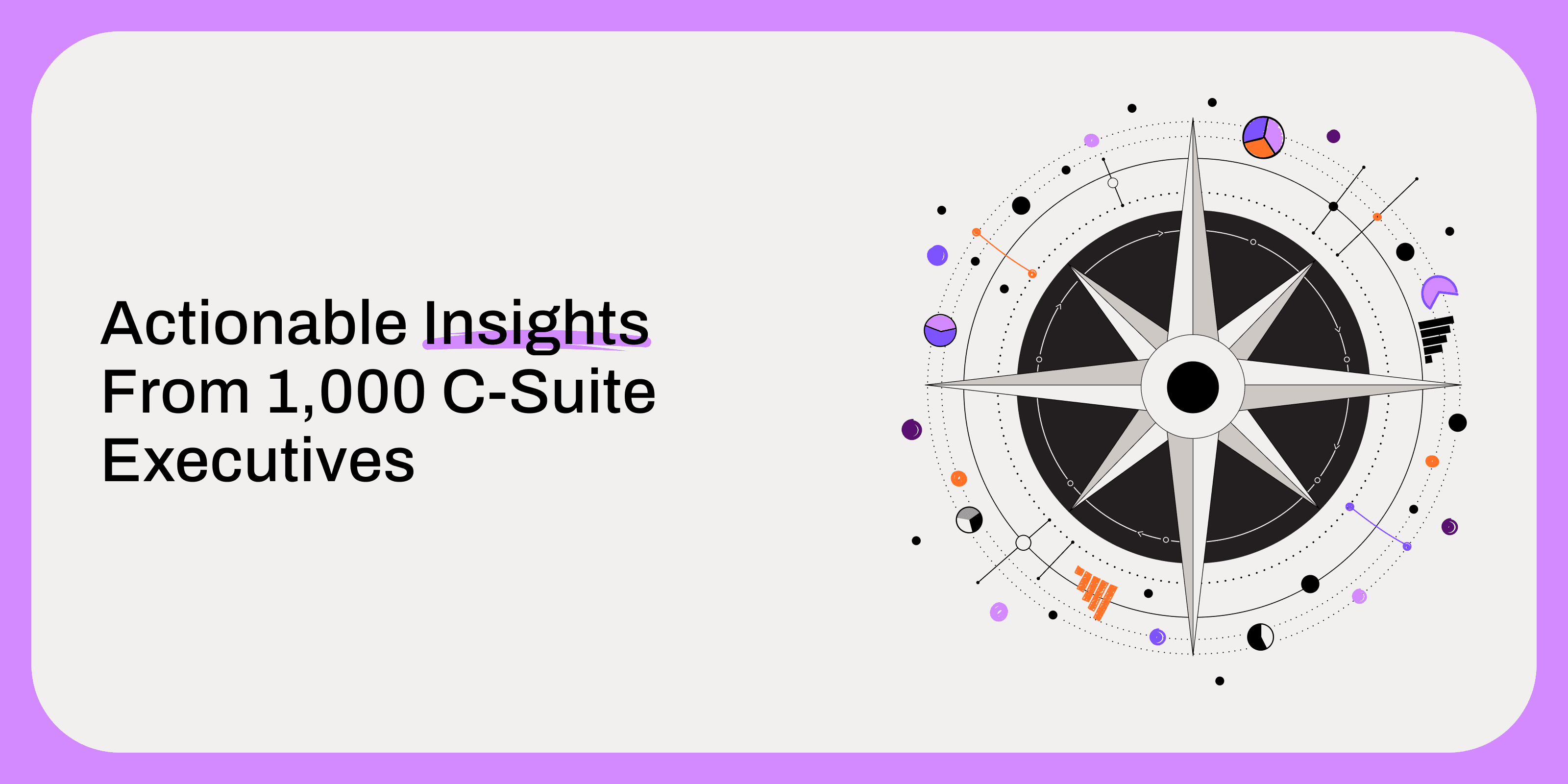
Tags
Share
Executive Summary
Generative artificial intelligence (GenAI) ushers in a new wave of optimism for transforming how every organization plans, operates, automates, and differentiates in the market. These unique opportunities, brought on by GenAI, will impact areas such as revenue and growth, operational efficiency, cost reduction, strategic differentiation, and even brand presence. Moreover, most organizations expect a strong return on digital transformation impact in areas such as customer intelligence, sales intelligence, AI collaboration, and other areas in customer experience (CX).
Constellation Research and Dialpad recently surveyed more than 1,000 senior executives in the United States, Canada, United Kingdom, Australia, and New Zealand about their AI initiatives. The survey, conducted from December 2023 to January 2024, showed the impact of AI on tasks, decision-making, and investment decisions. Respondents demonstrated overall interest in applying AI to CX, sales, and general business by flagging these projects as a large percentage of their overall budget.
Based on the survey data and conversations with hundreds of senior executives, successful leaders intend to prioritize projects based on both operational efficiency and revenue and growth. Over 77% of leaders believe AI will provide them a competitive advantage. AI adoption is clearly a top priority for executives in the C-suite reporting to the CEO—or what is commonly known as CxOs—with the focus on implementing AI projects that align with their company’s priorities and learning from early adopters.
Key Takeaways
77% of leaders believe AI will provide them a competitive advantage.
75% of respondents believe AI will have a significant impact on their roles in the next three years.
77% are confident that AI can accurately share information and results.
69% of executives plan to spearhead their organization’s AI efforts.
54% of leaders are concerned about AI regulation.
38% of respondents are moderately to extremely concerned about AI.
91% of companies will determine they do not have enough data to achieve a level of precision their stakeholders will trust.
72% of CxOs plan to reskill workers for AI.
AI Is the Top Priority for Organizations in 2024 and Beyond
Exponentially more impactful than the internet, AI is the top priority for every business, across industries, geographies, and roles. Leading CxOs have rapidly responded to these board-driven, top-down mandates and investments. More than 75% of respondents believe AI will have a significant impact on their roles within the next three years. In fact, more than 69% of those surveyed already are using AI at work.

Early adopters have applied AI to these top 5 categories:
Analytics (13%). C-level executives want to know more from both rearview-mirror analytics and predictive analytics.
Automating work (13%). Organizations hope to automate highly repetitive and mundane tasks, freeing up time for more strategic tasks.
Communication or content creation (11%). Leaders expect faster content velocity and higher levels of orchestration.
Forecasting (11%). The ability to improve accuracy can drive cost savings that improve the bottom line.
Customer insights (10%). New insights can help leaders create new revenue streams.

These research findings closely align with hundreds of conversations with Constellation’s extensive network of CxOs. Customers expect the greatest return on transformation investment (RTI) to come from operations efficiency; revenue and growth; and regulatory compliance, risk mitigation, and proactive monitoring. Moreover, 86% of leaders believe AI is transforming work, resulting in a once-in-a-generation opportunity to transform their organizations.
Trust Growing Due To Familiarity With AI
Early adopters have mapped out how humans interact with AI, and trust has emerged as a key design point. Surprisingly, 49% of executives believe that they can somewhat trust AI, with 31% definitely trusting AI. In fact, more than 77% are confident that AI can accurately share information and results.
When executives were asked to name the No. 1 task they expected AI to automate, CX automation rose to the top—including self-service help for everything from handling service requests and orders to checking on status. On the flip side, the primary task executives do not want automated is decision-making without a human in the loop.
These findings highlight the growing trust in AI over time and the expectations that these systems will continue to exponentially improve. The bottom line: Enterprise leaders want to work with technology vendors who deliver on trust and work with foundational principles of AI. Constellation Research has set five principles for ethical and trusted AI, including transparency, explainability, reversibility, trainability, and having a human in the loop.

CxOs Leading AI Efforts Despite Some Nervousness
More than 69% of executives expect to spearhead their organization’s AI efforts, with those strongly agreeing (35%) and somewhat agreeing (35%) outperforming neutral respondents (16%), those strongly disagreeing (8%), and those somewhat disagreeing (6%). However, 42% of CxOs worry about security and compliance when it comes to AI. More than half of respondents believe their teams have very advanced (23%) or somewhat advanced (31%) adoption of AI.
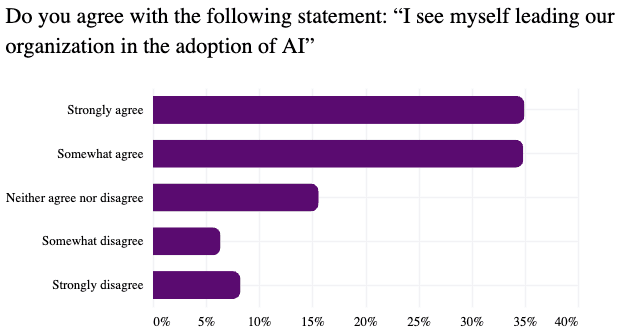
Forward-looking policies on experimentation with GenAI may be one reason for such advanced adoption, given 77% of respondents had liberal use policies in effect.
Most organizations expect to use new AI technologies to gain a significant competitive advantage (29%), while many expect to pursue new AI technologies to gain an early advantage (19%). A few intend to wait for a new approach with AI to prove itself and then move quickly, while others will wait for the new approach with AI to be well established with lots of support before adoption. Very few plan to avoid the use of AI altogether (10%).

Experienced Leaders Know How to Navigate Around Potential Risks
In general, the opportunities for AI are exponential. There is much good ahead. As with all technologies, the humans behind them can turn them into tools to advance humanity or pathways to less favorable outcomes. Common potential risks that can be controlled for include hallucinations, data leakage, security, accuracy, and cost.
Generative AI models rely on probabilities, which can occasionally result in the creation of incorrect or misleading information, also known as "hallucinations." Users are accustomed to deterministic responses, in which one plus one should equal two. When one plus one does not equal two, and may equal three, users will lose confidence in their AI systems. Whether hallucinations are the result of a feature or a bug, more than 38% of respondents are moderately to extremely concerned about the accuracy of AI results. In terms of data leakage, 50% of respondents found data leakage to be moderately to extremely concerning). No enterprise users want to see their data in the public domain without their permission.


Security concerns (22%) often include concerns about accidental release of intellectual property. Accuracy (18%) concerns may require more data signals and sources. Cost of models, compute power, and expertise (12%) also worry leaders.
At the macro level, 54% of leaders are concerned about AI regulation.

High-Quality, High-Volume Data Is the Heart of AI
Digital transformation has made more data available by digitizing the physical world. Enterprises that led the way in digital transformation built a foundation to take advantage of AI. In 2023, enterprises rushed to AI for an exponential advantage. Unfortunately, many organizations realized they did not have enough data to achieve precision decisions. Even more concerning, most enterprises do not have enough data, compute power, or energy to solve their problems. In fact, 91% of companies will determine they do not have enough data to achieve a level of precision their stakeholders will trust. Some will assume internal data will be good enough but most will discover this data is not good enough for most use cases.
For example, would 85% accuracy be good for customer service and support? Probably yes. Would 85% accuracy cut it for procurement? No. Would 85% accuracy make a CFO feel confident in finance? Definitely no. Would 85% accuracy be okay for patient visits in healthcare? Absolutely not!
Thus, AI would not exist without data. Savvy organizations realize that data is very important (35%) to extremely important (34%) for the success of AI. The good news: 67% of CxOs believe that their team is getting enough data to power AI efforts. A solid majority (80%) expect AI to help them better understand their data. More importantly, 74% believe they have enough data to get to a level of precision their stakeholders will trust.

AI Bringing a Competitive Advantage in the Enterprise
More than 77% of leaders expect AI will provide their organization with a competitive advantage. CX users rank increased efficiency as the top use case, followed by faster problem resolution, reduced costs, greater consistency and quality, and better insights into customers. For sales users, reduced costs drove the number one AI benefit with greater consistency and quality, better insights into clients, better client experience, and increased scale and linearity. General AI use cases focus on increased productivity followed by greater consistency and quality, reduced costs, and easier data analysis.
In addition, respondents are experimenting with a handful of solutions, with 33% of executives using two AI solutions, while 25% have no solutions in play. Almost as many respondents have three solutions (15%) as those that use one solution (18%). A small group of users (10%) have four or more solutions.

Of the 75% of respondents with contact centers, 63% use AI before, during, and after the call. Among those respondents, AI usage during a call is at 39%, before a call is at 32%, and after a call is at 29%.

Call notes or summaries (25%), call transcription (22%), automated call logging (19%), real-time coaching (17%), and live sentiment analysis (16%) drive AI use cases during these calls.

In addition, 73% expect AI to influence customers within the next five years, and 76% expect AI to help organizations better understand customer behavior. Thus, Constellation believes these trends fall in line with broader trends focused on cost reduction, operational efficiency, and regulatory compliance.
Organizations Planning to Skill Up Employees
The cultural path to AI will require dedicated training, reskilling, and investment for employees. Leaders expect a symbiotic relationship between humans and AI. To accomplish this lofty goal, CxOs plan to reskill workers for AI (72%). A majority of respondents plan to improve their own skills in AI in 2024 (68%). With new hires, AI skills play a key role in hiring decisions (66%). When it comes to subject matter experts in AI, organizations that have experts (41%) and do not but plan to (38%) lead the charge in building internal skills and talent.
Leaders must take the time to:
Provide up-to-date training for human and machine collaboration.
Create an environment that supports learning in general as well as learning from failure.
Develop training programs designed for humans operating at machine scale.

The Bottom Line: AI Will Augment And Amplify Human Capabilities
AI is bigger than the last great disruption, the internet. The move to digitization and digital transformation was a necessary half-step toward the move to AI. While some will now profess that the fifth Industrial Revolution is AI, AI is more exponential than the internet or the fake fourth Industrial Revolution, digital transformation. The dawn of the true fourth Industrial Revolution begins with AI. This cognitive era will be with us for decades to come, and CxOs should get started right away.
No organization can succeed with AI by itself. Successful AI projects will require choosing the right partner with the right AI strategy for the organization’s business model. Partners who bring pragmatic experience will follow seven rules:
Rule 1: Achieve data mastery.
Rule 2: Choose a strong business use case.
Rule 3: Understand how to partner for data sources and signals.
Rule 4: Monetize outcomes and generate derivatives.
Rule 5: Engage stakeholders.
Rule 6: Nourish networks.
Rule 7: Trust but verify.
Methodology
An online survey was conducted via Qualtrics from December 2023 to January 2024. A total of 1,007 C-suite executives in the U.S., U.K., Canada, Australia, and New Zealand across various business functions and industries were surveyed.
Message from the Sponsors
Google Cloud and Dialpad have teamed up to provide businesses with a leading AI-Powered Customer Intelligence Platform. Built on Google Cloud, Dialpad combines the most advanced AI Contact Center, AI Sales, AI Voice, and AI Meetings, Dialpad provides over 30,000 innovative brands and millions of users worldwide with the tools to unlock productivity, collaboration, and customer satisfaction. With Dialpad for Google – customers can make calls through the Dialpad Chrome extension and access all files, emails, and meetings right inside Dialpad with the Google Workspace integration.
Appendix
Here’s a snapshot of the survey’s demographics, including annual revenue, company size, and job titles:
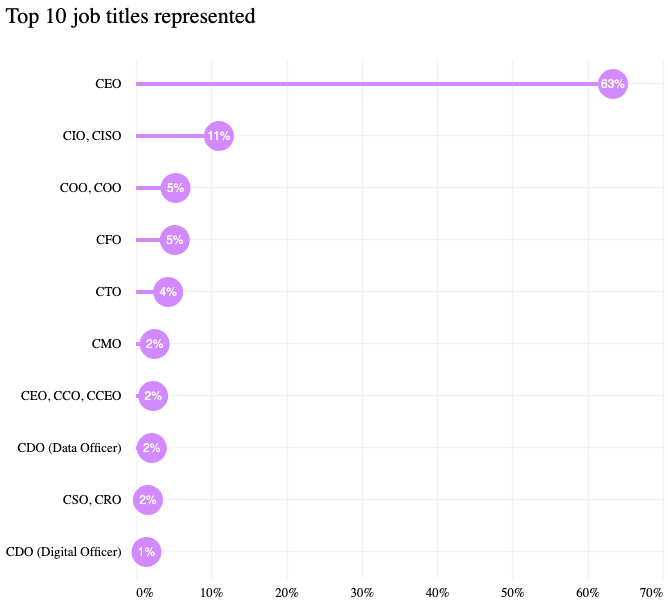
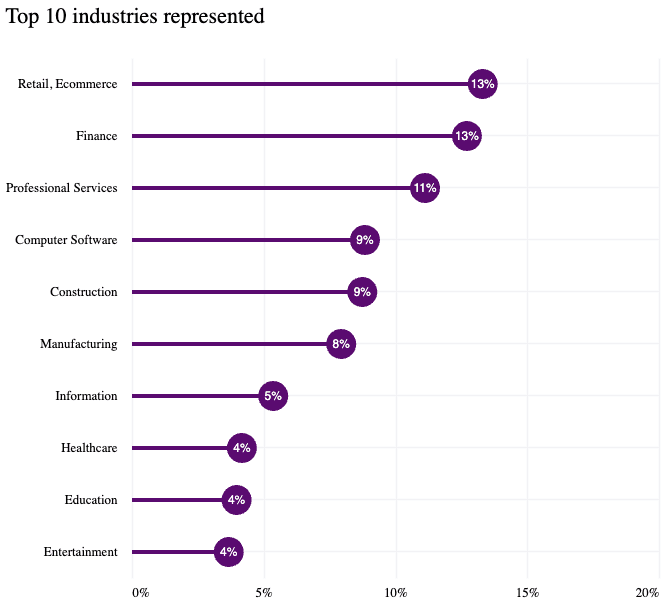
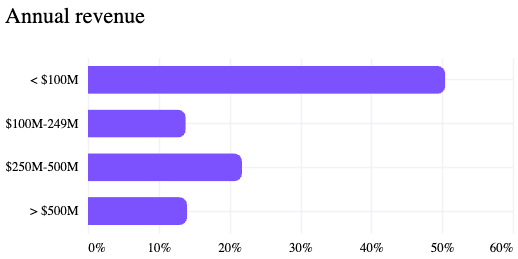
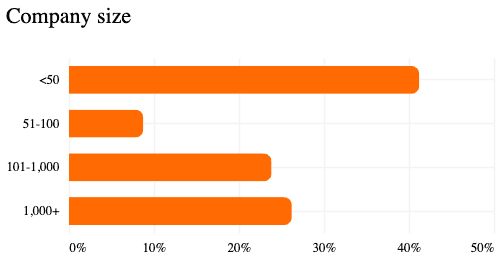
About the Author
R “Ray” Wang is founder, chairman, and principal analyst of Constellation Research and the author of the popular enterprise software blog A Software Insider’s Point of View. He previously was a founding partner and research analyst for enterprise strategy at Altimeter Group.
A background in emerging business and technology trends, enterprise apps strategy, technology selection, and contract negotiations enables Wang to provide clients and readers with the bridge between business leadership and technology adoption. Wang has been recognized by the prestigious Institute of Industry Analyst Relations (IIAR) as Analyst of the Year, and in 2009 he was recognized as one of the most important analysts for enterprise, SMB, and software. In 2010 Wang was recognized on the ARInsights Power 100 List of Industry Analysts and named one of the top influential leaders in the CRM Magazine Market Awards.
About Constellation
Constellation Research is an award-winning, Silicon Valley—based research and advisory firm that helps organizations navigate the challenges of digital disruption through business model transformation and the judicious application of disruptive technologies.
Unlike the legacy analyst firms, Constellation Research is disrupting how research is accessed, what topics are covered, and how clients can partner with a research firm to achieve success. Over 350 clients have joined from an ecosystem of buyers, partners, solution providers, C-suite, boards of directors, and vendor clients. Our mission is to identify, validate, and share insights with our clients.
Organizational Highlights
Named Institute of Industry Analyst Relations (IIAR) New Analyst Firm of the Year in 2011 and #1 Independent Analyst Firm for 2014 and 2015.
Experienced research team with an average of 25 years of practitioner, management, and industry experience.
Organizers of the Constellation Connected Enterprise—an innovation summit and best practices knowledge-sharing retreat for business leaders.
Founders of Constellation Executive Network, a membership organization for digital leaders seeking to learn from market leaders and fast followers.
Ready to empower your organization further with AI?
See how Dialpad's AI-powered communications platform helps companies stay connected, improve sales, and provide better customer experiences. Book a demo, or watch a tour of the Dialpad app!








